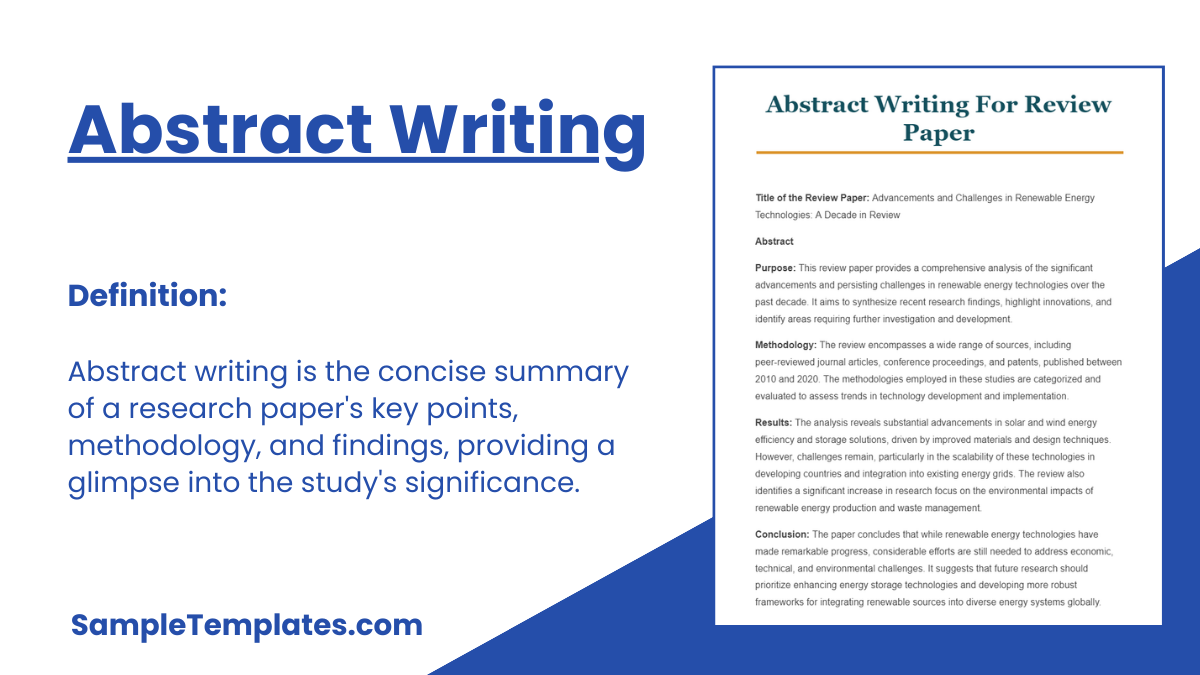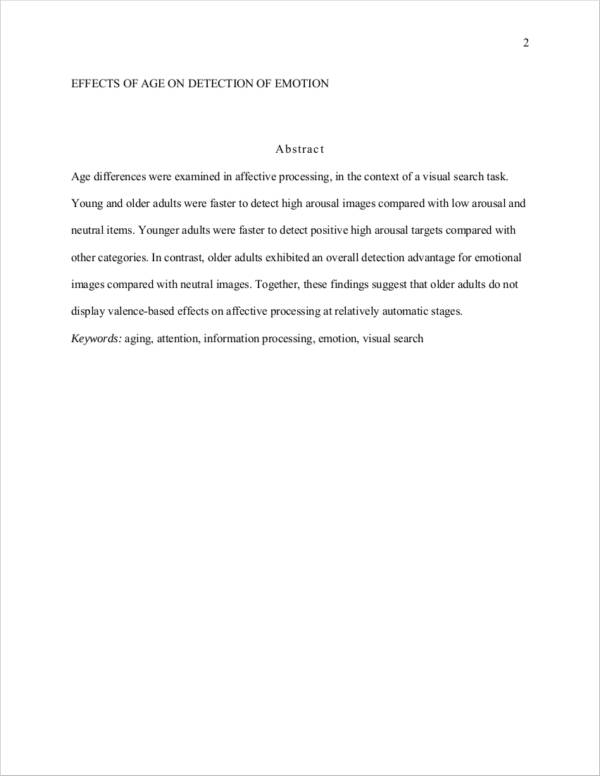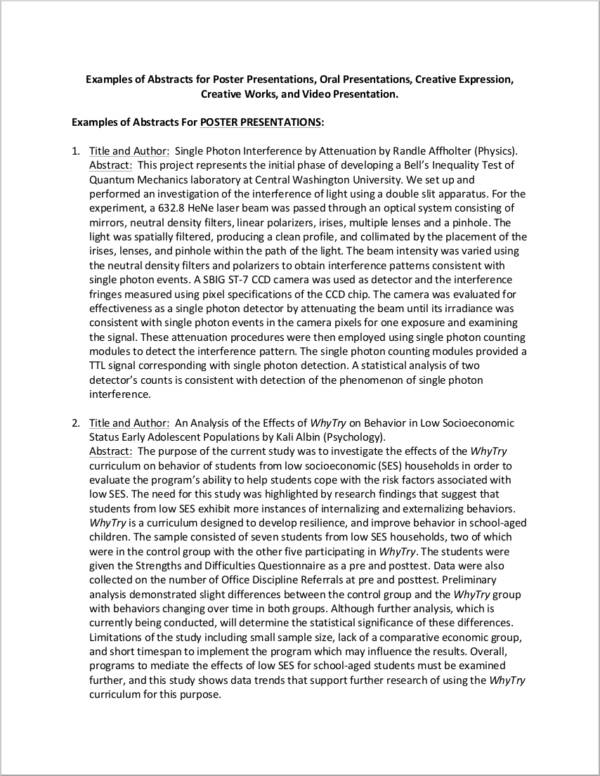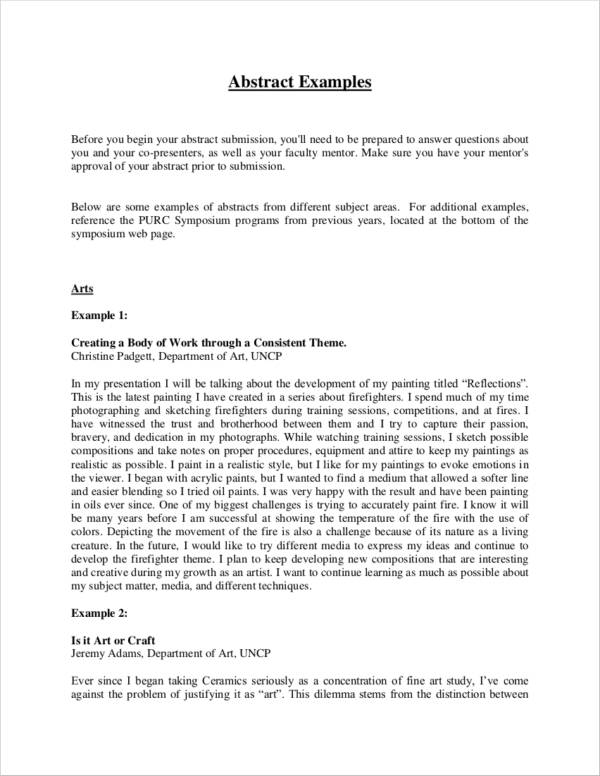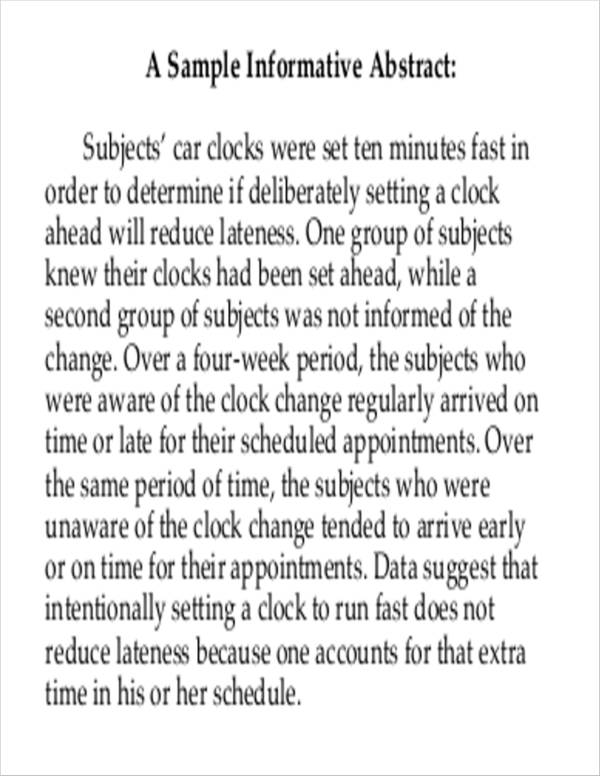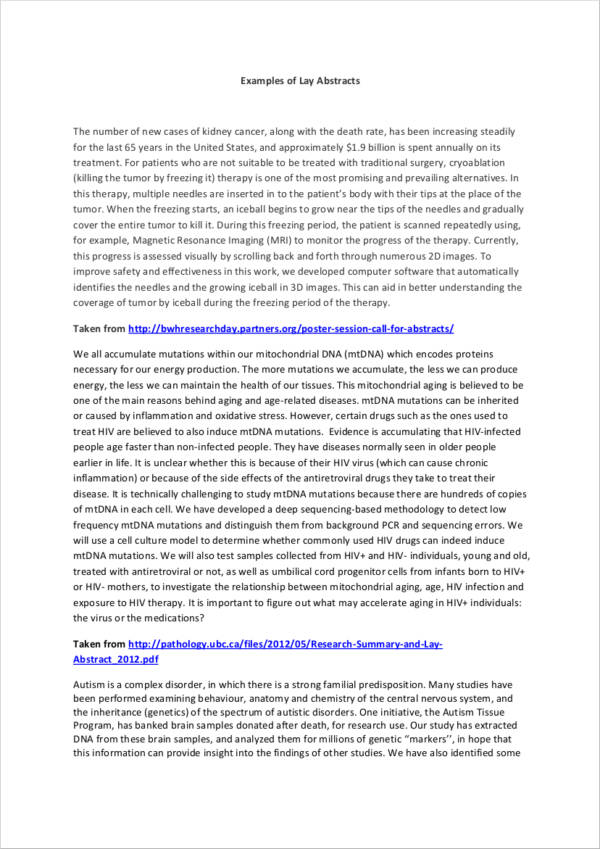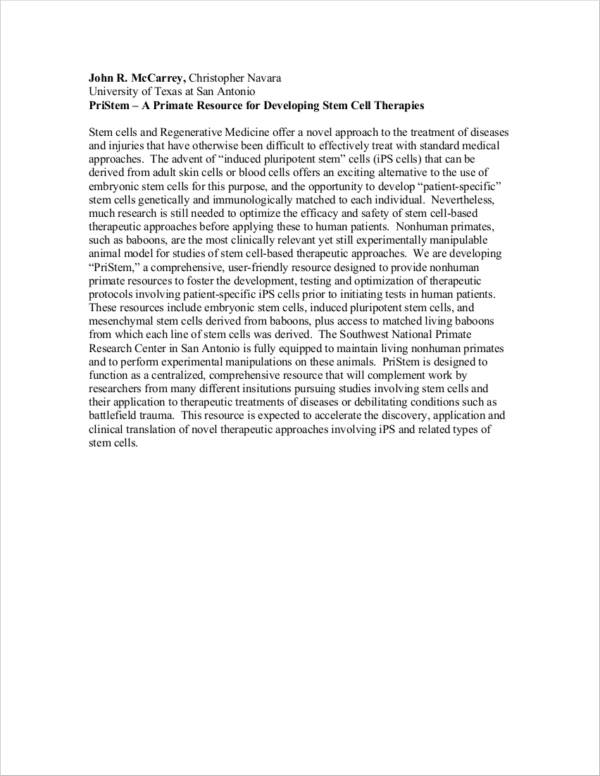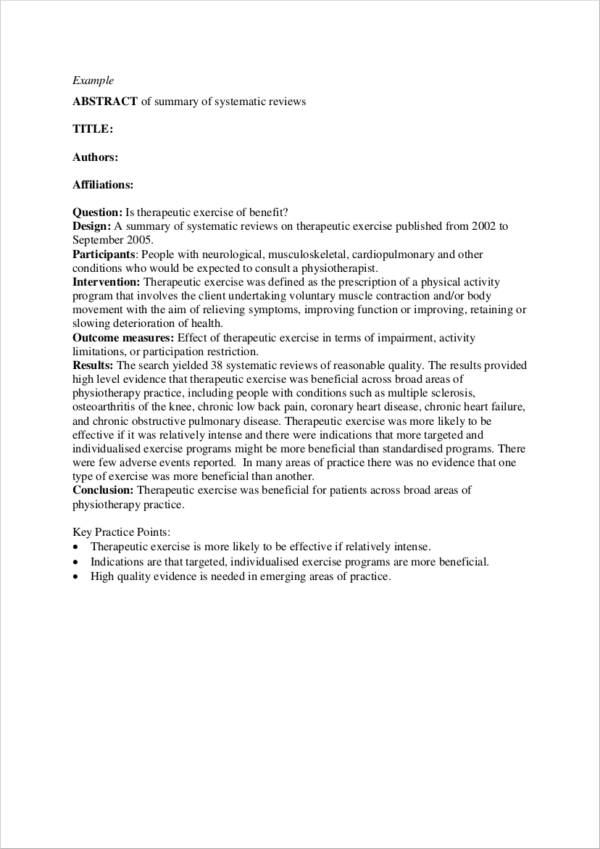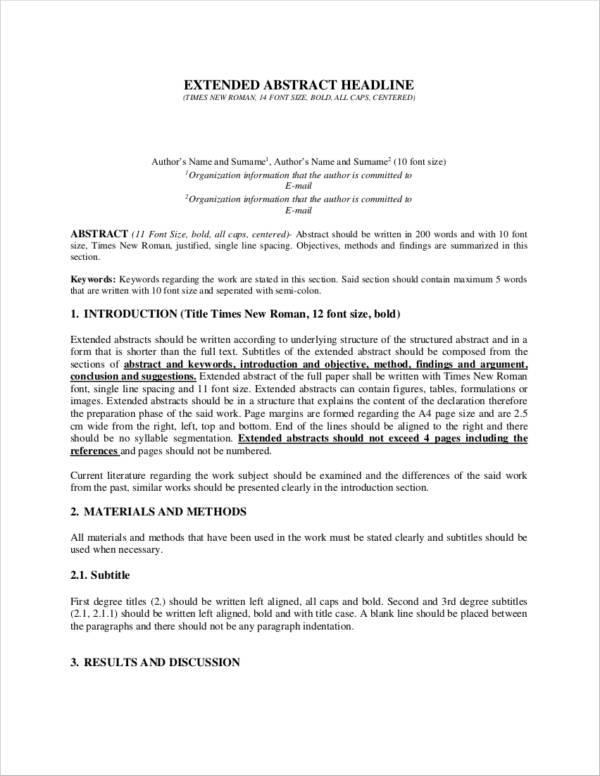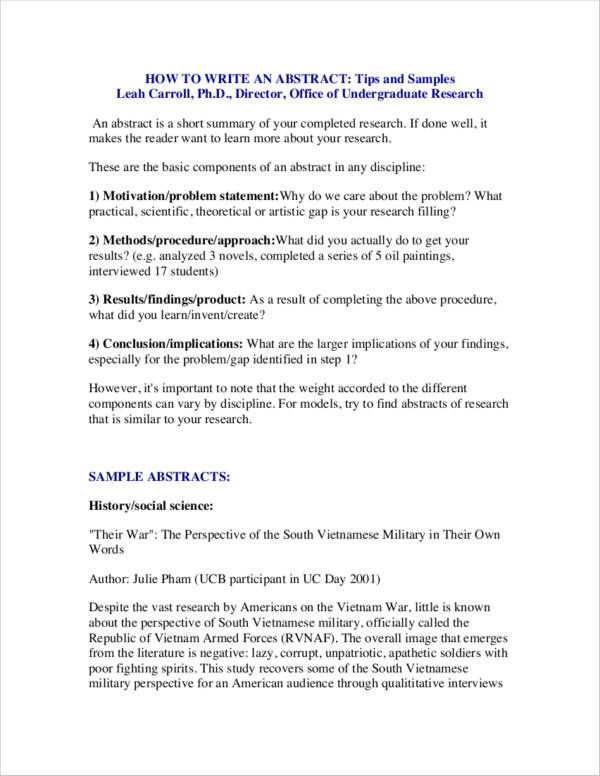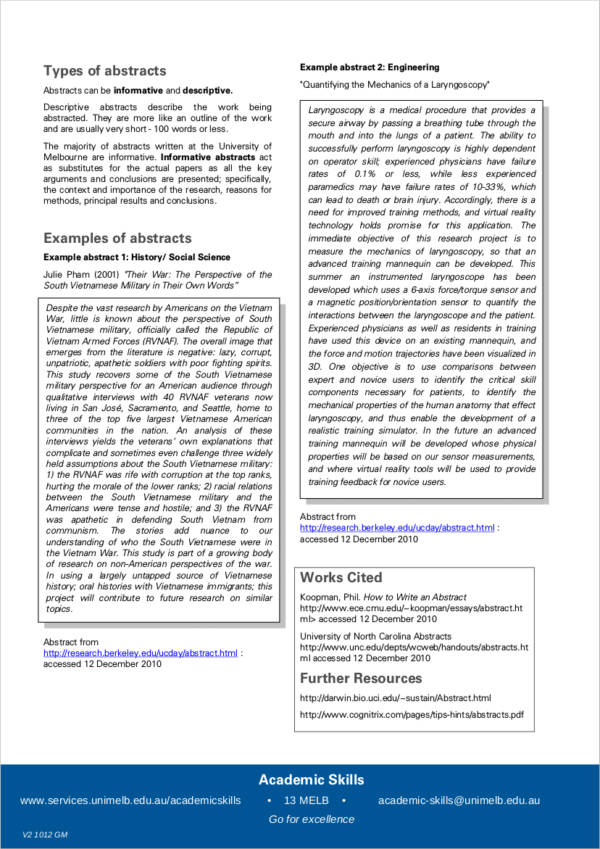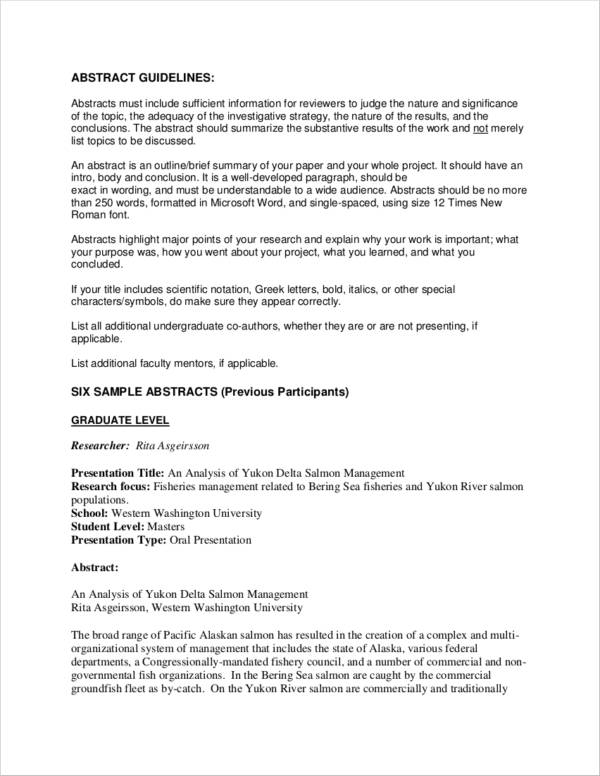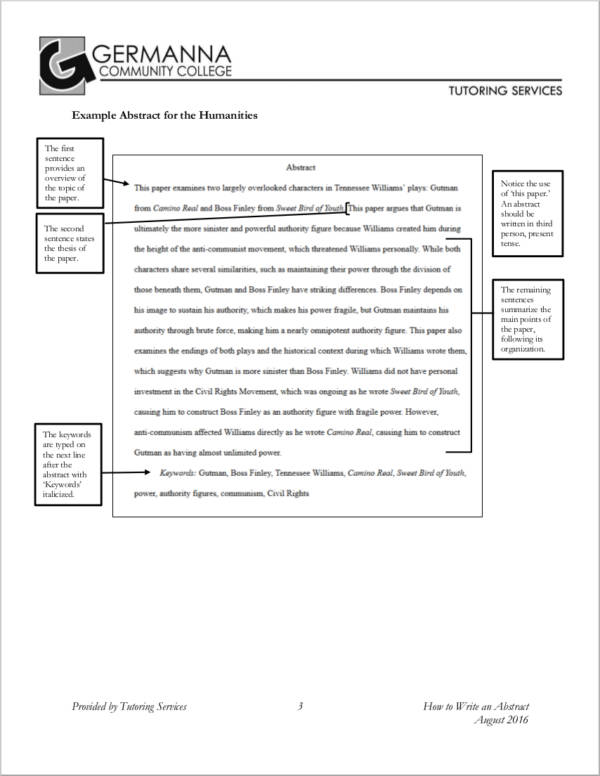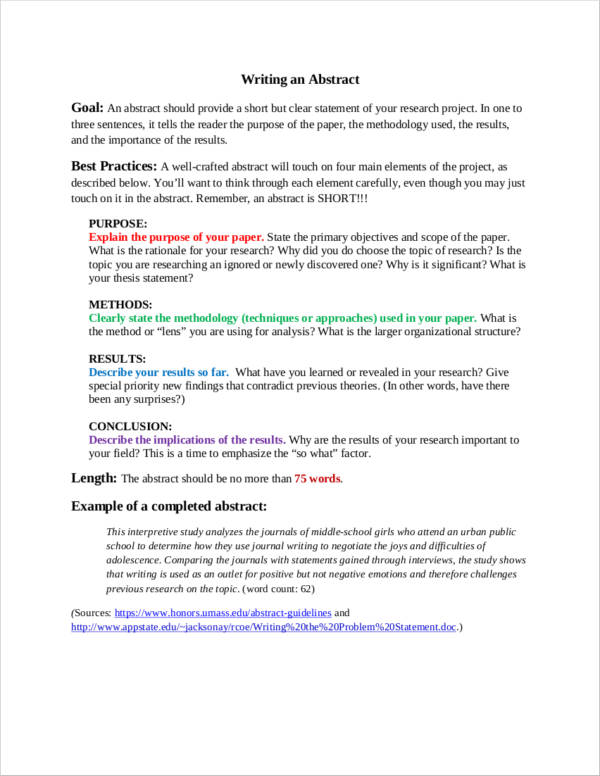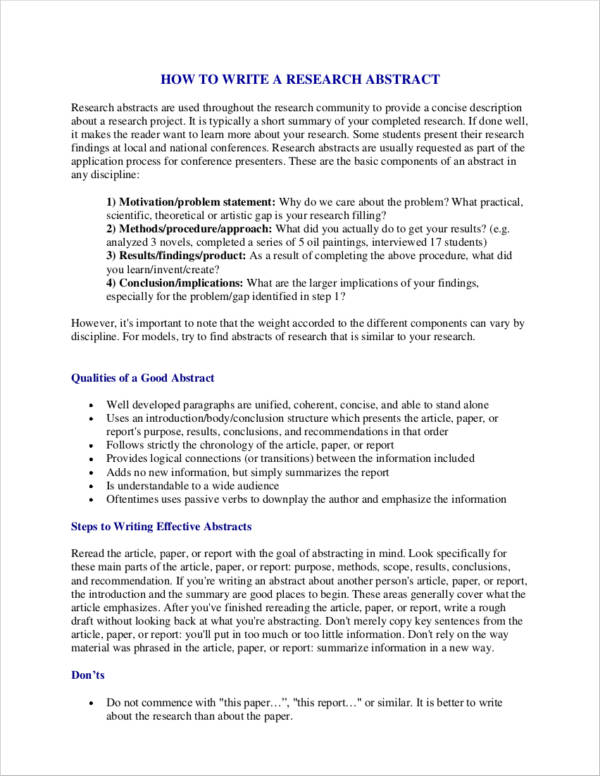Coming up with a good thesis proposal is one of the most challenging tasks that you will encounter as a student. All the sleepless nights you have encountered, all of the corrections your teacher has made, and statistical computations you have made will all be worth it once you are finished with your research. It is now time for you to finalize everything and make all of the necessary edits to ensure that your research paper ends up being polished and ready for publishing.
One of the last sections that you would write for your research paper or academic essay is an abstract. An abstract is a good summary of what your paper or study is all about.
If you are new to writing research papers and abstracts, we would like to offer some help. Plus, we also have a few sample abstracts that would give you a good idea of how abstracts look like. Without further ado, let us dig deeper to how you can come up with an effective and well-written abstract.
�>
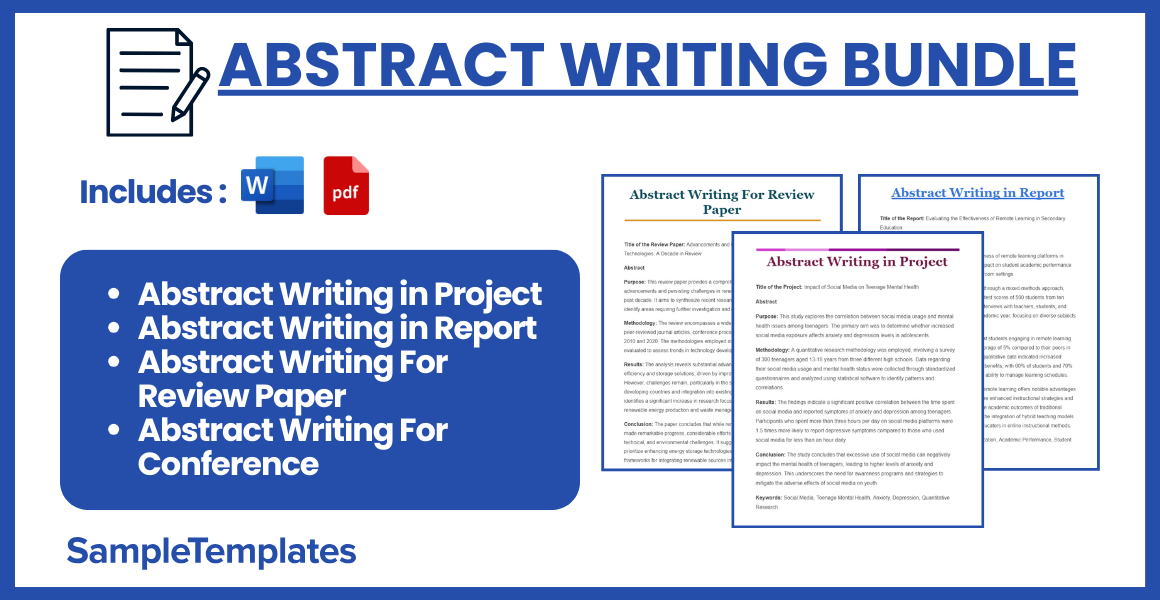
Download Abstract Writing Bundle
Abstract Writing in Project
Title of the Project: Impact of Social Media on Teenage Mental Health
Abstract
Purpose: This study explores the correlation between social media usage and mental health issues among teenagers. The primary aim was to determine whether increased social media exposure affects anxiety and depression levels in adolescents.
Methodology: A quantitative research methodology was employed, involving a survey of 300 teenagers aged 13-18 years from three different high schools. Data regarding their social media usage and mental health status were collected through standardized questionnaires and analyzed using statistical software to identify patterns and correlations.
Results: The findings indicate a significant positive correlation between the time spent on social media and reported symptoms of anxiety and depression among teenagers. Participants who spent more than three hours per day on social media platforms were 1.5 times more likely to report depressive symptoms compared to those who used social media for less than an hour daily.
Conclusion: The study concludes that excessive use of social media can negatively impact the mental health of teenagers, leading to higher levels of anxiety and depression. This underscores the need for awareness programs and strategies to mitigate the adverse effects of social media on youth.
Keywords: Social Media, Teenage Mental Health, Anxiety, Depression, Quantitative Research
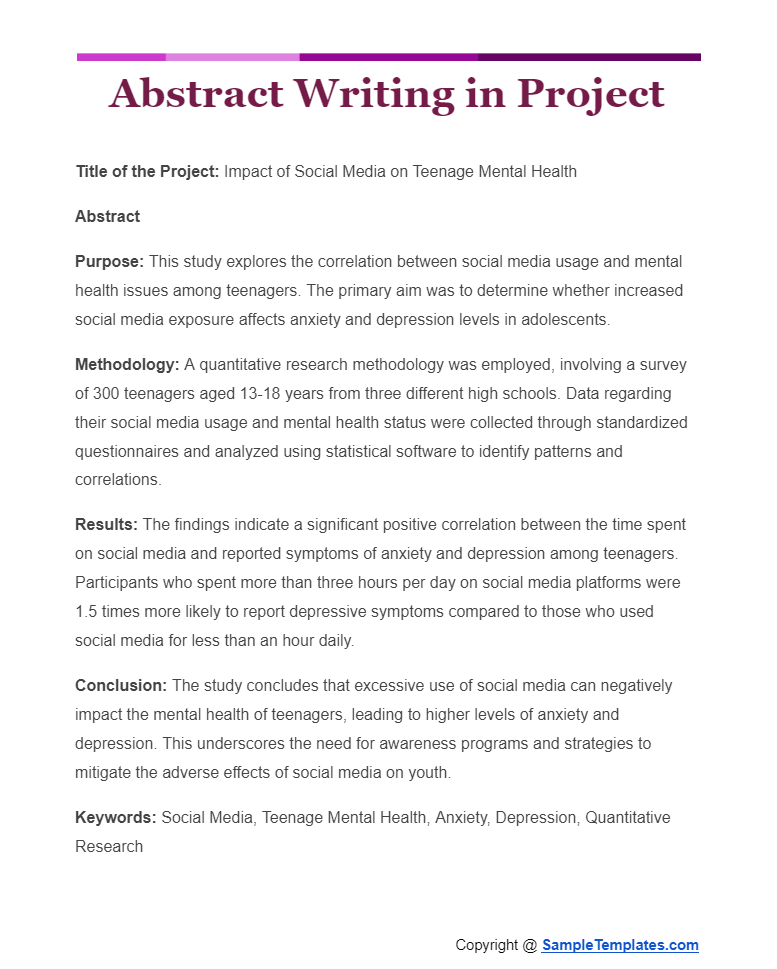
Abstract Writing in Report
Title of the Report: Evaluating the Effectiveness of Remote Learning in Secondary Education
Abstract
Purpose: This report investigates the effectiveness of remote learning platforms in secondary education, aiming to assess their impact on student academic performance and engagement compared to traditional classroom settings.
Methodology: The evaluation was conducted through a mixed-methods approach, combining quantitative data from standardized test scores of 500 students from ten secondary schools with qualitative data from interviews with teachers, students, and parents. The study spanned the 2022-2023 academic year, focusing on diverse subjects including mathematics, science, and literature.
Results: The quantitative analysis revealed that students engaging in remote learning showed a slight decline in test scores by an average of 5% compared to their peers in traditional classroom environments. However, qualitative data indicated increased flexibility and self-paced learning as significant benefits, with 60% of students and 70% of parents reporting higher satisfaction with the ability to manage learning schedules.
Conclusion: The report concludes that while remote learning offers notable advantages in flexibility and student autonomy, it may require enhanced instructional strategies and more robust engagement practices to match the academic outcomes of traditional teaching methods. Recommendations include the integration of hybrid teaching models and increased professional development for educators in online instructional methods.
Keywords: Remote Learning, Secondary Education, Academic Performance, Student Engagement, Mixed-Methods Evaluation
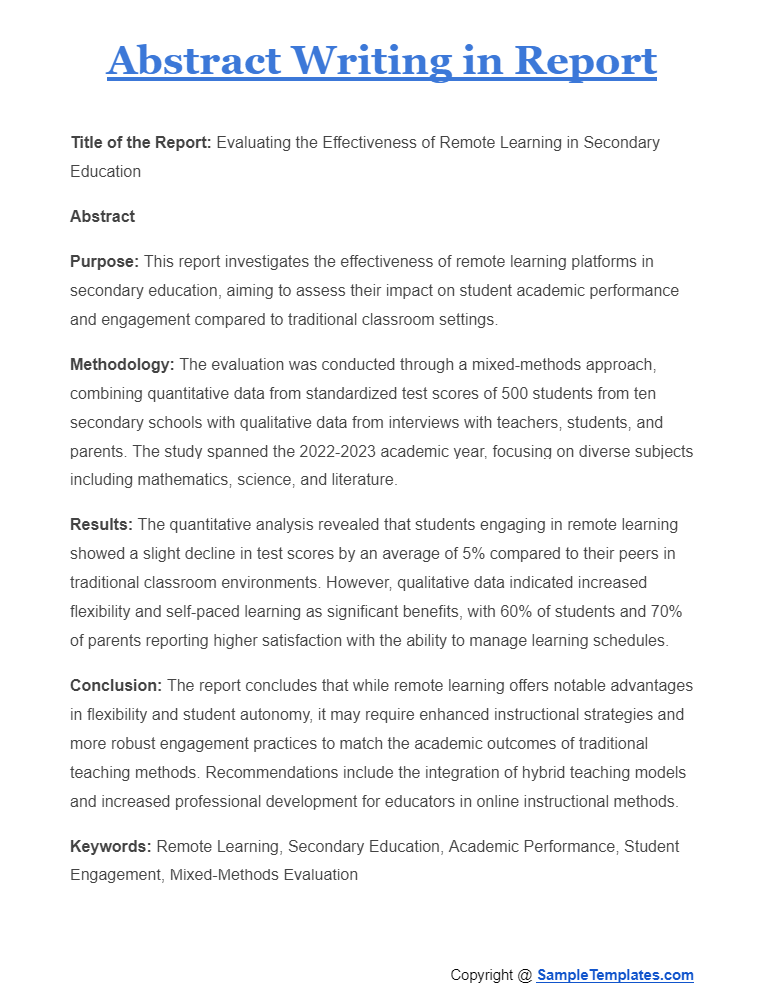
Abstract Writing For Review Paper
Title of the Review Paper: Advancements and Challenges in Renewable Energy Technologies: A Decade in Review
Abstract
Purpose: This review paper provides a comprehensive analysis of the significant advancements and persisting challenges in renewable energy technologies over the past decade. It aims to synthesize recent research findings, highlight innovations, and identify areas requiring further investigation and development.
Methodology: The review encompasses a wide range of sources, including peer-reviewed journal articles, conference proceedings, and patents, published between 2010 and 2020. The methodologies employed in these studies are categorized and evaluated to assess trends in technology development and implementation.
Results: The analysis reveals substantial advancements in solar and wind energy efficiency and storage solutions, driven by improved materials and design techniques. However, challenges remain, particularly in the scalability of these technologies in developing countries and integration into existing energy grids. The review also identifies a significant increase in research focus on the environmental impacts of renewable energy production and waste management.
Conclusion: The paper concludes that while renewable energy technologies have made remarkable progress, considerable efforts are still needed to address economic, technical, and environmental challenges. It suggests that future research should prioritize enhancing energy storage technologies and developing more robust frameworks for integrating renewable sources into diverse energy systems globally.
Keywords: Renewable Energy, Technology Advancement, Solar Energy, Wind Energy, Environmental Impact, Energy Storage
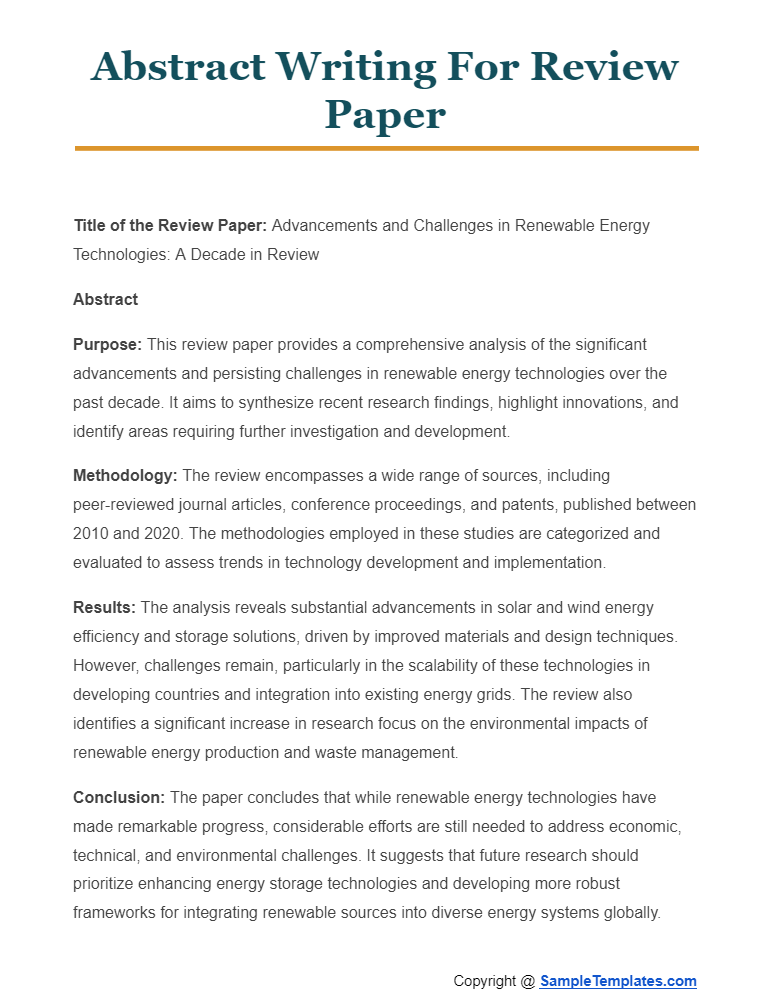
Abstract Writing For Conference
Title of the Presentation: The Digital Influence: Exploring the Impact of Digital Marketing on Consumer Behavior
Abstract
Purpose: This presentation examines the transformative impact of digital marketing strategies on consumer behavior over the last decade. It aims to identify key trends and shifts in consumer interactions and purchasing decisions influenced by digital marketing efforts.
Methodology: Utilizing a mixed-methods approach, the study analyzed data from multiple sources, including consumer surveys, online purchasing data, and social media engagement metrics from 2015 to 2020. Additionally, several focus groups were conducted to gain qualitative insights into consumer attitudes towards digital advertising and social media marketing.
Results: The findings suggest a significant correlation between exposure to digital marketing and changes in consumer purchasing patterns. Notably, consumers exposed to targeted advertising were 30% more likely to make a purchase. Social media marketing was found to significantly enhance brand recall and loyalty, particularly among millennials and Gen Z consumers.
Conclusion: The study highlights the increasing importance of digital marketing as a dominant force shaping consumer behavior. It underscores the need for brands to adopt integrated digital strategies to effectively engage with the modern consumer. Recommendations for marketers include leveraging data analytics for targeted advertising and utilizing social media platforms to enhance consumer engagement and brand loyalty.
Keywords: Digital Marketing, Consumer Behavior, Social Media Marketing, Purchasing Decisions, Brand Loyalty
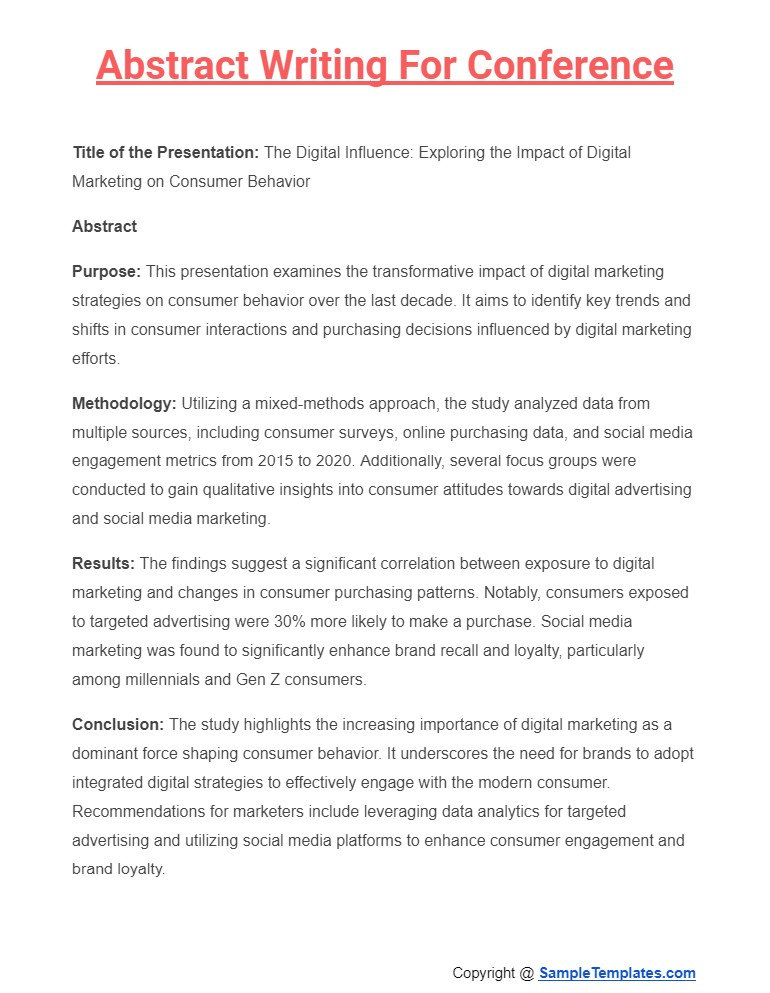
Browse More Templates On Abstract Writing
Sample Abstract in PDF
Abstracts for Poster Presentation Template
Abstract Example
Purpose of an Abstract
An abstract serves as a concise summary of a research paper, thesis, dissertation, or scholarly article. Its main purposes are:
- Brevity: It provides a brief overview of the key points of the research, including the purpose, methodology, results, and conclusions, all condensed into a few paragraphs.
- Clarity: By clearly outlining the main findings and significance of the research, it allows readers to quickly understand the essence of the study without having to read the entire document.
- Accessibility: An abstract makes the information more accessible to a wider audience, including scholars who are scanning literature for relevant studies, practitioners looking for applicable findings, and policymakers seeking research insights.
- Indexing: Abstracts are used by academic databases for indexing purposes, helping other researchers find relevant papers based on keywords and topics.
- Decision-Making: It aids readers in deciding whether the full text of the article will be relevant to their own research or interests, saving time and effort.
In essence, the abstract acts as a standalone synopsis that highlights the most critical aspects of the research, facilitating broader dissemination and efficient understanding of the scholarly work.
Sample Informative Abstract Template
Lay Abstract Template
Sample Scientific Abstract Template
What is the Structure of an Abstract?
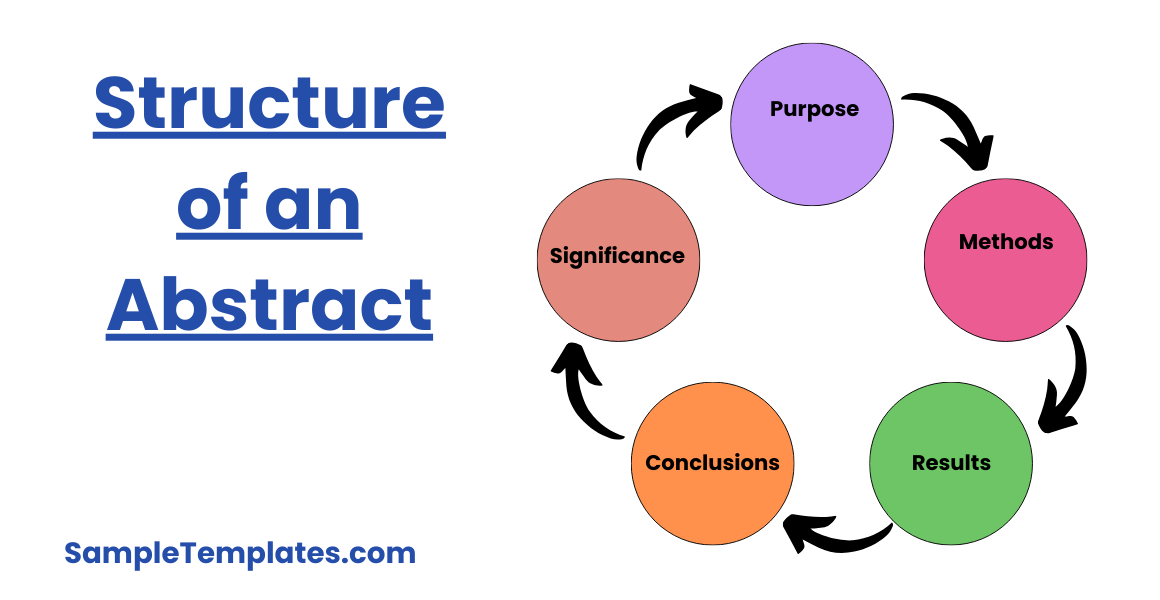
The structure of an abstract typically follows a clear, concise format that includes several key components, often reflecting the overall structure of the research paper format itself. Here’s a common structure:
- Purpose: Start by stating the main purpose or objective of the research. This tells the reader what you were trying to achieve or discover.
- Methods: Briefly describe the methodology used to conduct the research. This could include the type of research (qualitative, quantitative, experimental, etc.), the sample size, and the tools or techniques used.
- Results: Summarize the most important findings of the study. This should be straightforward and quantifiable where possible, highlighting significant data points and outcomes.
- Conclusions: Outline the conclusions that can be drawn from the results. This may include the implications of the findings or how they contribute to the field of study.
- Significance: Optionally, you can also include a sentence about the significance of the work—why it is important, and how it advances knowledge or understanding in the field.
Here are some additional tips for writing an effective abstract:
- Conciseness: An abstract should be brief, typically 150-300 words, depending on the guidelines of the publication or academic discipline.
- Clarity: Use clear and concise language. Avoid unnecessary jargon, overly complex sentences, and any kind of filler content.
- Accuracy: Ensure the abstract accurately reflects the content of the paper. It should not include information that does not appear in the main text.
- Non-evaluative: Generally, an abstract should report information without offering evaluation or interpretation beyond what is found in the research.
Writing a strong abstract is crucial as it is often the first (and sometimes only) part of your research that will be read. It acts as a hook that can persuade someone to read further into your paper.
Formal Abstract Template
Writing the Abstract
An abstract is usually used when you are writing academic essays or papers such as a research paper. It is usually just a short write-up that gives a summary of what your scientific paper is all about. It aims to give the reader a good idea of what the sample paper is all about. It will also help the reader know whether the paper you have written is in line with their interest or otherwise.
Abstracts are usually written last as you would need to finish your paper first in order to write a summary of it. So how to write an abstract for a research paper? Keep reading as we would be giving you a quick and easy guide to how you can do so.
1. How to Get Started?
Before you get started on your abstract, you should do a couple things first. Remember, we did mention that an abstract is made right after you finish your paper. So here is what you need to do before you get started on your abstract. You may also see script writing samples
- Finish your paper first. Save the writing of your abstract for last. Whether it is a thesis paper or a research paper, make sure that you finish writing it first. This way, it will be easier for you to come up with a good executive summary that will flow smoothly. Plus, your summary will be more accurate as you already know how your paper starts and ends. You may also like essay writing samples
- Review guidelines. Typically, you will be given a set of guidelines to follow when it comes to thesis writing. Included with these guidelines would be a guideline on how you should make your abstract look like. Remember to take a peek at these guidelines to ensure that you are formatting your abstract appropriately.
- Know your readers. Your abstract will be a good basis for your reader whether they would be using it for further research or as a basis for their own research. It also helps them see what the main argument of your paper is. So it is best to know how the needs of your audience and know how accessible you want your paper to be. You may also check out summary writing samples
- Know what type of abstract you should write. There are two types of abstracts out there: descriptive abstracts and informative abstracts. If you have been tasked to write a specific type of abstract do so. If you have yet to know what type of abstract you should be coming up with, we will help you figure out by giving you a quick description of each type of abstract. You may also see book writing templates
- Descriptive abstracts would typically be around 100?200 words in length. They would typically be used if your paper is relatively short. This type of abstract will define the purpose, goal, and methods you have used for your research.
- Informative abstracts are longer than descriptive ones. They are usually one page long and would give a better overview of your paper.
2. Starting to Write the Abstract
- Think of your purpose. Why are you writing your paper? You would need to let your reader know why your research matters. Use the following guide questions to help you out:
- Why did you choose the topic?
- What are the methods you used?
- What are your findings?
- Why are the findings deemed important?
- Why should the reader go through the rest of your paper?
- Talk about the problem. Let the reader know what your research is trying to address. You should also include the scope of your study, as well as the central argument that you have all throughout your paper. You may also check out article writing
- The methods. Briefly discuss how you approached the problem and what are the variables that you have used. Give the reader a good overview of the sources that you have used for your paper.
- Talk about your results. Talk about the results that you have gathered from your study, if your hypothesis/hypotheses is/are supported by the results, and what the general findings of your study are. This part is applicable for informative abstracts only. If you are writing a descriptive abstract, skip this step. You may also like biography writing
- Briefly discuss your conclusion. This would be the ending of your abstract. This is where you will talk about the implications of your study, as well as the implications of your results.
3. Abstract Format
We would like to help you make your abstracts look polished and professional. So how should an abstract be formatted? Here’s how you do it.
- Make sure that it is in order. This means that you should answer your questions in order. It should also have the basic introduction, body, and conclusion as well. If you were given a set of guidelines to follow for your research paper, religiously follow said guidelines. You may also check out memo writing samples
- Provide ample amount of information. Make sure that you explain in a clear manner. Make use of simple language and avoid using any acronyms and abbreviations. Make sure that you also do not leave your audience hanging. You may also see business report writing samples & templates
- Write it separately. Start from scratch. Make sure that there are no repetitions in your abstract. Never copy and paste from the main content of your paper. Treat your abstract as a separate entity of your paper. You may also like job application writing samples & templates
- Make use of keywords. By using keywords, you will be able to make your study be easier to find for future use by other researchers.
- Stick to the facts. Your abstract is the gauging tool that would determine whether your paper is worth the read or otherwise. Make sure that what you are writing is based on facts. You may also check out sample letter writings
- Leave out specifics. Your abstract is a summary and is not meant to talk about specific details. Briefly explain your study. An in-depth explanation should be found in the body of your research paper. However, you should still avoid making use of jargon or terms, which are considered to be too technical.
- Revise. Revisions are inevitable with whatever type of write-up you are writing. Simple revisions such as taking care of grammatical errors and misspelled words should be done. You may also see technical writing
- Ask someone to read your abstract. It would be a good idea to ask someone to read through your abstract and ask for constructive criticism. Is it easy to understand? Are there terms that are difficult to understand? Do you need to rearrange your paragraphs? These are some things that might be reviewed in your abstract, so be ready to make a few revisions. You may also check out business writing samples
Our paper formatting guidelines can help you come up with a good way of formatting your abstract. A more specific means of formatting your abstract can also be found at How to Format Your Research Paper.
Sample Extended Abstract Template
Sample Historical Abstract Template
Sample Abstracts Template
Abstract Examples in PDF
Tips For Writing an Abstract
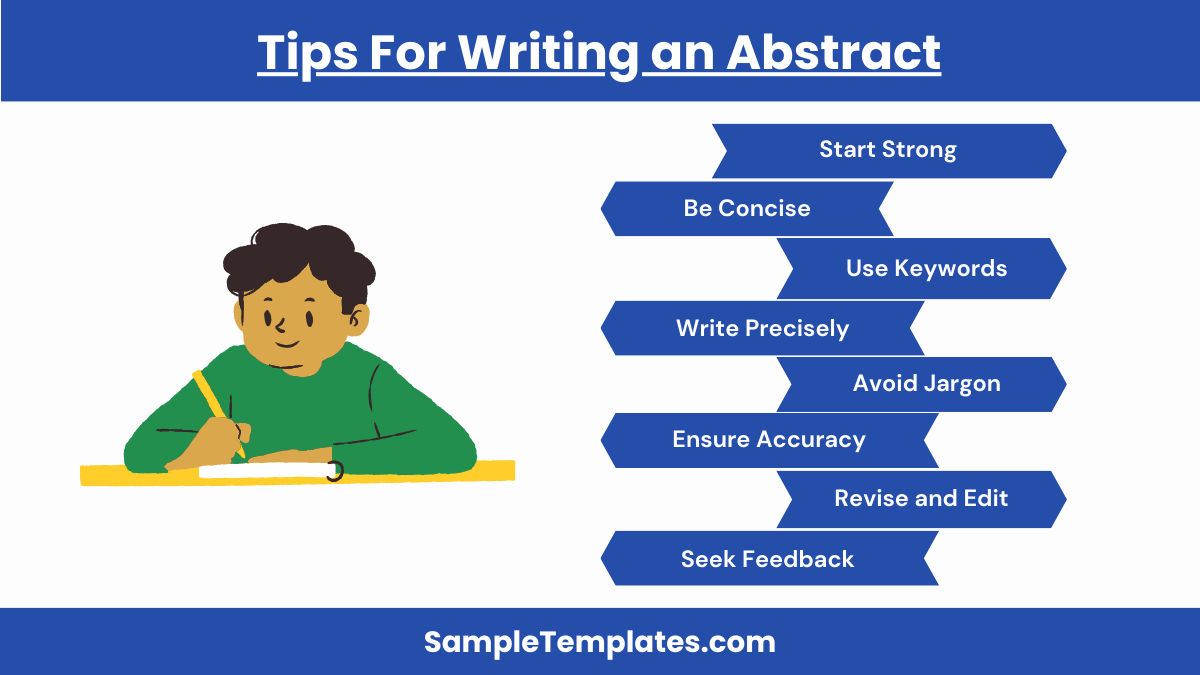
Writing a compelling and informative abstract is crucial for capturing the essence of your research paper outline and engaging your audience. Here are some key tips to consider when crafting an abstract:
- Start Strong: Begin with a clear sample statement of the main topic or problem addressed by the research. This helps set the context for the reader immediately.
- Be Concise: An abstract should be succinct and to the point. Avoid unnecessary details, filler words, or overly complex sentences. Stick to the word limit, typically between 150 and 300 words.
- Follow the Structure: Adhere to the typical structure of purpose, methods, results, and conclusions. This helps in maintaining clarity and ensures that all critical aspects of the research are covered.
- Use Keywords: Include relevant keywords that capture the core aspects of the research. This enhances discoverability in electronic searches and is particularly important for readers scanning through many abstracts in databases.
- Focus on Significance: Highlight the significance of your findings and their implications. Explain why your research is important and how it contributes to the field. This can persuade readers to delve into the full paper.
- Write Precisely: Be specific in your descriptions, especially when presenting results and conclusions. Use precise numbers and outcomes if possible, as vague statements can diminish the perceived value of your research.
- Avoid Jargon: While technical terms are sometimes necessary, minimize jargon to ensure that your abstract is accessible to a broader audience, including those not specialized in your field.
- Ensure Accuracy: The abstract must accurately reflect the content of the full paper. It shouldn’t contain information that isn’t presented in the main text, nor should it omit critical details.
- Revise and Edit: After writing your abstract, revisit it to cut out unnecessary words, correct errors, and polish sentences. A well-written abstract can make a significant difference in how your paper is perceived.
- Seek Feedback: Before finalizing, get feedback from peers or mentors. They can provide insights on clarity, completeness, and whether the abstract effectively represents your research.
By following these tips, you can write an effective abstract that serves as a powerful introduction to your research, attracting the attention of potential readers and setting a professional tone for your paper.
Abstract for the Humanities Template
Standard Completed Abstract Template
Sample Research Abstract Template
Key Takeaway
So what have we learned today?
1. An abstract is a write-up attached to the front of your research paper or scientific paper. They are composed of a paragraph or two that gives a simple breakdown of what a reader should expect from the whole paper. You may also see speech writing samples
2. Finish your paper first before deciding to write your abstract. You will be able to write your abstract better that way.
3. Follow guidelines with formatting. If you have been given a specific set of guidelines to follow, you should definitely do so. If you have not been given a guideline, read through a few abstracts to gain a better perspective on how to write an abstract. You may also like resume writing samples & templates
We hope we have accomplished our mission of helping you out with your abstract. The best of luck on your finished paper!
Need guidelines for writing other academic papers? Check out How to Write in an Academic Style.
What is abstract and example?
An abstract is a brief sample summary of a research article, thesis, or review, focused on the key points of the work. Example: “This study explores climate change impacts on coastal erosion, utilizing satellite imagery and climate modeling to track changes over a decade.
What are the 4 C’s of an abstract?
The 4 C’s of an abstract are Clarity, Conciseness, Coherence, and Completeness. These ensure the abstract effectively summarizes the research, is easy to read, logically structured, and contains all necessary information.
Do you write the abstract first or last?
Typically, you write the abstract last, even though it appears first in the document. This allows you to accurately summarize the completed paper and ensure all key results and conclusions are included.
How to start an abstract?
To start an abstract, briefly introduce the main topic or problem, state the purpose of the research, and mention the methodology used. This sets up the context and scope for the reader right away.
What is the rule of abstract?
The rule of abstract writing is to keep it short (usually under 300 words), informative, non-evaluative, and self-contained. It should provide a clear overview of your research without needing to refer to the text.
How not to write an abstract?
To avoid common pitfalls in abstract writing, do not include excessive jargon, vague statements, or information not present in the paper. Avoid unnecessary background information and don’t cite references.
In conclusion, mastering abstract writing requires succinctly summarizing key points, ensuring clarity, and adhering to the specified format. Crafting an effective abstract enhances the readability and impact of academic papers, facilitating broader dissemination and understanding of research findings.
Related Posts
Sample Business Card Templates
Sample Cashier Job Descriptions
Questionnaire Samples
FREE 10+ Sample HR Resource Templates in PDF
FREE 10+ HR Consulting Business Plan Samples in MS Word | Google Docs | Pages | PDF
FREE 49+ Sample Job Descriptions in PDF | MS Word
FREE 16+ Nonprofit Budget Samples in PDF | MS Word | Excel | Google Docs | Google Sheets | Numbers | Pages
FREE 13+ Academic Calendar Templates in Google Docs | MS Word | Pages | PDF
FREE 10+ How to Create an Executive Summary Samples in Google Docs | MS Word | Pages | PDF
FREE 23+ Sample Event Calendar Templates in PDF | MS Word | Google Docs | Apple Pages
Company Profile Samples
FREE 10+ Leadership Report Samples [ Development, Training, Camp ]
FREE 24+ Sample Payment Schedules in PDF | MS Word
FREE 10+ Return to Work Action Plan Samples in PDF | DOC
Autobiography Samples & Templates
